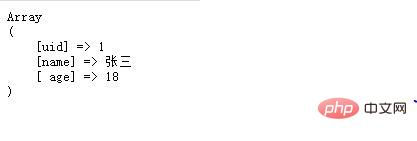 Backend Development
Backend Development
 PHP Problem
PHP Problem
 What is cookie.session? What is the difference between them? (detailed introduction)
What is cookie.session? What is the difference between them? (detailed introduction)
What is cookie.session? What is the difference between them? (detailed introduction)
The previous article introduced to you "Why does PHP have security issues? What are the essence and three elements of safety issues? 》, this article continues to introduce to you what cookie.session is? What is the difference between them? Let’s study together! ! !

What are cookies and sessions?
Cookie: a cookie stored on the user side- A small piece of text, a technique used by the server to identify the user.
session: Based on cookies, but the data is not stored on the client, but on the server. The client only stores an id, also called session id. The server can use this session .id to find the user's information.
We understand that the http protocol is a stateless protocol. When we browse the website, how does the backend know the client's information? Therefore, we can use the above two methods (cookie, session)
What is the difference between cookie and session?
Specifically, the cookie mechanism uses a solution that maintains state on the client side, while the session mechanism uses a solution that maintains state on the server side. At the same time, we also see that due to the use of server-side persistence The state solution also needs to save an identity on the client, so the session mechanism may need to use the cookie mechanism to achieve the purpose of saving the identity, but in fact it has other options.
Cookie mechanism. The orthodox cookie distribution is through extension Implemented by the HTTP protocol, the server adds a special line of instructions to the HTTP response header to prompt the browser to generate the corresponding cookie according to the instructions. However, pure client-side scripts such as JavaScript or VBScript can also generate cookies. The use of cookies It is automatically sent to the server in the background by the browser according to certain principles. The browser checks all stored cookies. If the declared scope of a cookie is greater than or equal to the location of the resource to be requested, the cookie is attached to the request. The HTTP request header of the resource is sent to the server.
The content of the cookie mainly includes: name, value, expiration time, path and domain. The path and domain together constitute the scope of the cookie. If the expiration time is not set, it means that this cookie The cookie's lifetime is during the browser session. When the browser window is closed, the cookie disappears. This type of cookie whose lifetime is during the browser session is called a session cookie. Session cookies are generally not stored on the hard disk but in memory. Of course, this behavior is not stipulated in the specification. If the expiration time is set, the browser will save the cookies to the hard disk. After closing and opening the browser again, these cookies will still be valid until the set expiration time is exceeded. Stored on the hard disk Cookies can be shared between different browser processes, such as two IE windows. For cookies stored in memory, different browsers have different processing methods
(cookie) specific code For example:
<?php //setcookie('tittle','答案很长,我准备用一生的时间来回答,你准备要听了吗?'); echo $_COOKIE['tittle']; ?>
Code explanation:
First set a cookie function, you can use the setcookie function, how to set it after we set the cookie function take out? As can be seen from the code, we can use $_cookie[], but when we execute this code, the result shows that there is no such title (the code result is shown below). When we comment out setcookie, the execution code shows that we entered The result, (as shown below),


(session) code:
<?php //setcookie( 'title', 'www. php.cn'); //echo $_ COOKIE[ 'title']; // session session_start(); $_SESSION[ 'user'] = array( 'uid'=>1, 'name'=>'张三' , ' age'=>18); echo '<pre class="brush:php;toolbar:false">' ; print_r($_SESSION[ 'user']); ?>
The code results are as follows:

Recommended learning: "PHP Video Tutorial"
The above is the detailed content of What is cookie.session? What is the difference between them? (detailed introduction). For more information, please follow other related articles on the PHP Chinese website!

Hot AI Tools

Undresser.AI Undress
AI-powered app for creating realistic nude photos

AI Clothes Remover
Online AI tool for removing clothes from photos.

Undress AI Tool
Undress images for free

Clothoff.io
AI clothes remover

Video Face Swap
Swap faces in any video effortlessly with our completely free AI face swap tool!

Hot Article

Hot Tools

Notepad++7.3.1
Easy-to-use and free code editor

SublimeText3 Chinese version
Chinese version, very easy to use

Zend Studio 13.0.1
Powerful PHP integrated development environment

Dreamweaver CS6
Visual web development tools

SublimeText3 Mac version
God-level code editing software (SublimeText3)

Hot Topics
 OWASP Top 10 PHP: Describe and mitigate common vulnerabilities.
Mar 26, 2025 pm 04:13 PM
OWASP Top 10 PHP: Describe and mitigate common vulnerabilities.
Mar 26, 2025 pm 04:13 PM
The article discusses OWASP Top 10 vulnerabilities in PHP and mitigation strategies. Key issues include injection, broken authentication, and XSS, with recommended tools for monitoring and securing PHP applications.
 PHP Secure File Uploads: Preventing file-related vulnerabilities.
Mar 26, 2025 pm 04:18 PM
PHP Secure File Uploads: Preventing file-related vulnerabilities.
Mar 26, 2025 pm 04:18 PM
The article discusses securing PHP file uploads to prevent vulnerabilities like code injection. It focuses on file type validation, secure storage, and error handling to enhance application security.
 PHP API Rate Limiting: Implementation strategies.
Mar 26, 2025 pm 04:16 PM
PHP API Rate Limiting: Implementation strategies.
Mar 26, 2025 pm 04:16 PM
The article discusses strategies for implementing API rate limiting in PHP, including algorithms like Token Bucket and Leaky Bucket, and using libraries like symfony/rate-limiter. It also covers monitoring, dynamically adjusting rate limits, and hand
 PHP Input Validation: Best practices.
Mar 26, 2025 pm 04:17 PM
PHP Input Validation: Best practices.
Mar 26, 2025 pm 04:17 PM
Article discusses best practices for PHP input validation to enhance security, focusing on techniques like using built-in functions, whitelist approach, and server-side validation.
 PHP XSS Prevention: How to protect against XSS.
Mar 26, 2025 pm 04:12 PM
PHP XSS Prevention: How to protect against XSS.
Mar 26, 2025 pm 04:12 PM
The article discusses strategies to prevent XSS attacks in PHP, focusing on input sanitization, output encoding, and using security-enhancing libraries and frameworks.
 ACID vs BASE Database: Differences and when to use each.
Mar 26, 2025 pm 04:19 PM
ACID vs BASE Database: Differences and when to use each.
Mar 26, 2025 pm 04:19 PM
The article compares ACID and BASE database models, detailing their characteristics and appropriate use cases. ACID prioritizes data integrity and consistency, suitable for financial and e-commerce applications, while BASE focuses on availability and
 PHP Password Hashing: password_hash and password_verify.
Mar 26, 2025 pm 04:15 PM
PHP Password Hashing: password_hash and password_verify.
Mar 26, 2025 pm 04:15 PM
The article discusses the benefits of using password_hash and password_verify in PHP for securing passwords. The main argument is that these functions enhance password protection through automatic salt generation, strong hashing algorithms, and secur
 PHP Interface vs Abstract Class: When to use each.
Mar 26, 2025 pm 04:11 PM
PHP Interface vs Abstract Class: When to use each.
Mar 26, 2025 pm 04:11 PM
The article discusses the use of interfaces and abstract classes in PHP, focusing on when to use each. Interfaces define a contract without implementation, suitable for unrelated classes and multiple inheritance. Abstract classes provide common funct





